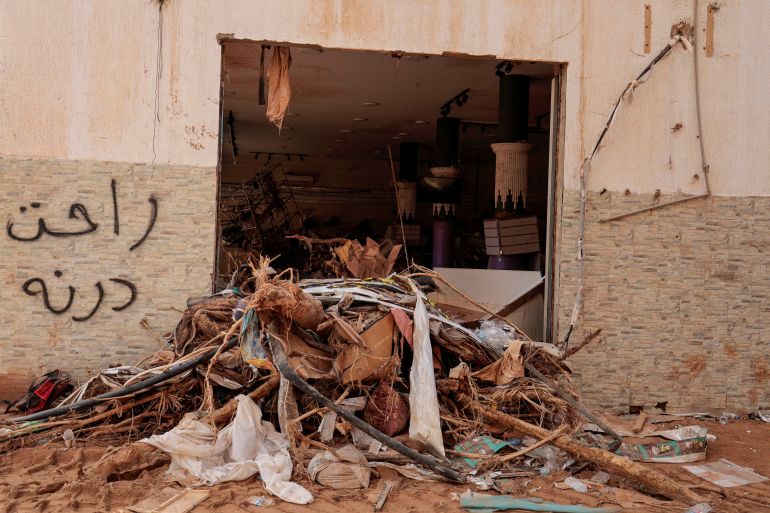Analysis: Libya and Morocco’s twin tragedies highlight differences
Libya and Morocco experienced tragedies in the same week, but there are clear differences in how they played out.

The count of the dead and missing from the twin catastrophes that struck Libya and Morocco almost two weeks ago already stands at more than 14,000. The final figure, when it comes, will likely be far higher.
However, in the minds of many around the world, the lines that separate the two tragedies have blurred.
Keep reading
list of 4 itemsPhotos: Libyans protest against authorities in flood-hit Derna
What can the world learn from Libya’s dam disaster?
Does Morocco have what it needs to cope with its earthquake disaster?
Their natural causes and geographic proximity may go some way to lending them a veneer of similarity, but the stark differences that separate the two should be enough to separate them.
“People just need stories they can understand,” the German journalist and Libya analyst, Mirco Keilberth, who covered the Moroccan earthquake, said. “It’s easier, if only psychologically, to combine the two.
“People need to understand what’s happening, and, let’s face it, an earthquake in Morocco is easier to grasp than the politics around the floods in Derna, which disrupt any clear narrative.”
Keilberth’s point can be illustrated by the events in Libya. In Derna, beyond the rain, it was human error, laziness and greed that combined to make a natural disaster far worse.
Complicated Libya
Perception is also pivotal. For a global public struggling to imagine the topography of the stricken areas, Morocco’s High Atlas Mountains are easier to grasp.
Not only has the area been a popular tourist destination for years, the police and army appeared happy to work with journalists and local associations bringing relief.
In stark contrast were the authorities in Derna, who, shaken by popular protest, limited access to the flood area under the guise of civil protection, and eventually forced reporters out.
The reality is that Libya is complicated.
“The overriding issue is one of division,” Riccardo Fabiani, North Africa Project Director for the Crisis Group said. “There are two governments and any number of militias all competing for influence.”
Within that milieu, any report or analysis that may favour one faction over another risks upending a larger tapestry of power networks and delicately poised balances of power.
In Morocco, there is simply one government and one king.
“Morocco is what I like to call, ‘vertically integrated’,” Fabiani continued. “That’s to say, when Mohammed VI says something, it happens; all the way from the top to the bottom of society.
“That’s why we saw that following his return from France; levels of aid and military relief increased significantly,” he added.
“There are many problems with governance in Morocco, but you can’t deny that the current king has laid more tarmac and developed the country’s infrastructure and healthcare system far more than any of his predecessors.”
While making it clear that he made no excuses for dams going unmaintained or warnings ignored, Fabiani said that it was inevitable that there would be problems when Libya’s rival governments had to work together.
“People also tend to lose sight of just how much water fell on Derna before the floods. This is about the dams and the conflict, that’s true, but it’s also about climate change,” he said.
International alliances
In Morocco, while the kingdom has received extensive criticism for being slow to respond to the offers of international support, access was eventually granted.
Though limited in number, teams from Qatar, the UAE, Spain, and others were eventually on the ground and working with the Moroccan army.
However, the addition of aid workers from Israel while French teams stayed away both served to cement Morocco’s newfound relationship with Israel as well as send a clear signal to Morocco’s former colonial occupier.
For Libya, and Benghazi especially, international aid carried more political significance.
Oil-rich Libya has played host to countless numbers of foreign groups since its revolution eventually gave way to civil war and the current volatile stalemate that just about holds.
Egypt, which has long nurtured ambitions for greater influence within Libya’s east, deployed rescuers in significant numbers. Likewise, relief from Russia, whose Wagner paramilitary group has long been present in eastern Libya, was also quick in coming.
Turkey, which has long sought greater influence in Libya, has boasted that its teams remained present after the Spanish and Greek teams had concluded their work.
Questions for Morocco
While Morocco’s response can arguably be called better than Libya’s, there are still many with questions.
“Morocco is really good at announcements,” Intissar Fakir of the Middle East Institute said. “The king and the government can celebrate the relief packages they’ve just announced, but follow[ing] through remains a problem. We need better and more planning regulation, and that could be an issue.”
“Morocco is very fond of its heritage, and those mud and clay adobe houses are undeniably beautiful and warm in winter, but they need modernising, as do the roads. That’s going to need conversation, compromise and [it] could be complicated,” she added.
Moreover, while Rabat had been quick to establish a single point of relief, where bodies from around the world are able to donate to earthquake relief, the lack of a similar structure in Libya gives some indication of the chaos in the latter, Fakir said.
But, ultimately, while this may all speak of the differences that divide the two, there is a greater bond that will bind them forever – the unimaginable loss that each has suffered in a week full of tragedy.